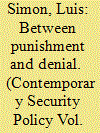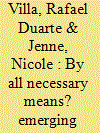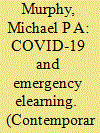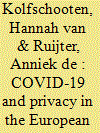|
|
|
Sort Order |
|
|
|
Items / Page
|
|
|
|
|
|
|
| Srl | Item |
| 1 |
ID:
172104


|
|
|
|
|
| Summary/Abstract |
Most debates on U.S. military strategy in the Western Pacific revolve around the question of how to deter China. Advocates of deterrence by punishment believe that the Chinese threat is serious but not critical, because the United States can leverage its global military-technological advantages to preserve a position of regional military primacy. Those in favor of deterrence by denial point to China’s potential and “home advantages,” and argue that the United States should settle for more modest objectives such as preventing Chinese regional military dominance. I argue that the high level of uncertainty around Chinese capabilities and the evolving Sino-American regional military balance have led the United States to adopt a flexible strategy, and embrace distinct–even contradictory–operational concepts to deter Beijing: The United States itself mostly focuses primarily on deterrence by punishment, while actively encouraging and enabling its regional allies to develop deterrence by denial.
|
|
|
|
|
|
|
|
|
|
|
|
|
|
|
|
| 2 |
ID:
172106


|
|
|
|
|
| Summary/Abstract |
Emerging powers from the global south have generally opposed the use of force in international politics. However, taking a closer look at the area of peacekeeping, the international community’s most institutionalized response to international insecurity, it is clear that the global south has been actively engaged in what has been described as peacekeeping’s coercive turn: the increasingly greater use of force. Building on the cases of Brazil and Indonesia, we argue that the peacekeeping policies of these emerging powers have been inconsistent with their declared reticence to use force. We explain the inconsistency by reference to knowledge imbalances between civilian and military actors, a gap in peacekeeping expertise and involvement in policy-making that allowed the armed forces to push the two countries into increasingly coercive peacekeeping. Moreover, civil–military knowledge imbalances prevented the emergence of alternative ideas more in line with Brazil’s and Indonesia’s traditional stance on the use of force.
|
|
|
|
|
|
|
|
|
|
|
|
|
|
|
|
| 3 |
ID:
172105


|
|
|
|
|
| Summary/Abstract |
Next to military means, causing disruption and interdiction, Western and local powers also relied on policies of containment to halt the expansion of the Islamic State’s territorial strongholds. Yet, a Cold War state-based strategy of containment seems not apt to counter a transformed Islamic State. This article, first, examines why containing the Islamic State was successful in the past. Second, the article argues that the Islamic State can still be contained if containment addresses the Islamic State’s hybrid nature rather than convulsively looking for the transferability of past containment aspects. In particular, this requires a focus on the struggle for power of the opponent and a foreign policy of restraint. Finally, the article proposes three angles to contain the Islamic State. Each angle exploits the persisting characteristics of the Islamic State as a revolutionary actor with internal contradictions and promulgating specific narratives which containment can engage.
|
|
|
|
|
|
|
|
|
|
|
|
|
|
|
|
| 4 |
ID:
172110


|
|
|
|
|
| Summary/Abstract |
The COVID-19 pandemic quickly led to the closure of universities and colleges around the world, in hopes that public health officials’ advice of social distancing could help to flatten the infection curve and reduce total fatalities from the disease. Drawing on Copenhagen school securitization theory and analyzing 25 declarations of emergency eLearning at American universities, I argue that in addition to COVID-19 being framed as a general threat, face-to-face schooling was also presented as a threat through these policies. A review of securitization theory—with particular attention to the question of advocacy and the relationship of desecuritization to emancipation—grounds the investigation theoretically. I argue that securitization theory is an important tool for educators not only for observing (and understanding) the phenomenon of emergency eLearning, but also for advocating the desecuritization of schooling after the COVID-19 crisis passes.
|
|
|
|
|
|
|
|
|
|
|
|
|
|
|
|
| 5 |
ID:
172109


|
|
|
|
|
| Summary/Abstract |
When disease becomes a threat to security, the balance between the need to fight the disease and obligation to protect the rights of individuals often changes. The COVID-19 crisis shows that the need for surveillance poses challenges to the right of privacy. We focus on the European Union (EU), which has a strong data protection regime yet requires its member states to exchange personal data gathered through contact tracing. While public authorities may limit the right to privacy in case of public health threats, the EU provides little guidance when such limitations are proportionate. To define standards, we analyze existing EU case law regarding national security measures. We conclude that on the proportionality of contact tracing in the EU it is difficult to reconcile public health measures and individual rights, but guidance can be taken from understandings of proportionality in the context of security, particularly in the current COVID-19 emergency.
|
|
|
|
|
|
|
|
|
|
|
|
|
|
|
|
| 6 |
ID:
172108


|
|
|
|
|
| Summary/Abstract |
It is often said that “diseases know no borders,” but COVID-19 has once again shown that policy responses certainly do. Governments have implemented bordering practices in a variety of ways to ensure that their own citizens are protected, even when in direct contravention to the International Health Regulations (IHR) of 2005. The IHR and the World Health Organization (WHO) have a strong preference for borders to remain open. Yet, we argue here, non-compliance by WHO member states is not the only problem with the IHR's treatment of borders. Bringing insights from critical border studies and exploring the varied ways in which the response to the COVID-19 crisis has been “bordered,” we argue that a much broader understanding of “borders” is required in the IHR and by the WHO, given that much of the exclusionary bordering we find takes place away from physical points of entry.
|
|
|
|
|
|
|
|
|
|
|
|
|
|
|
|
| 7 |
ID:
172107


|
|
|
|
|
| Summary/Abstract |
Foresight exercises are increasingly popular among different actors across the globe. Particularly in the context of uncertainties in world affairs, decision-makers are increasingly relying on forward-reasoning to inform their policy. Yet international relations (IR) scholarship is still hesitant to adopt a scenario-based approach. We argue for the use of scenario analysis as a complementary method that is both disciplined and creative. Through scenario analysis, IR scholars simultaneously remain rigorous and provide policy-relevant input that grasps the dynamics of unpredictability of real-world issues. The article discusses the Multiple Scenario Generation method as an unconventional but useful tool, elaborates on its theoretical considerations and concludes with four innovations that scenario analysis can provide for IR scholarship.
|
|
|
|
|
|
|
|
|
|
|
|
|
|
|
|
|
|
|
|
|